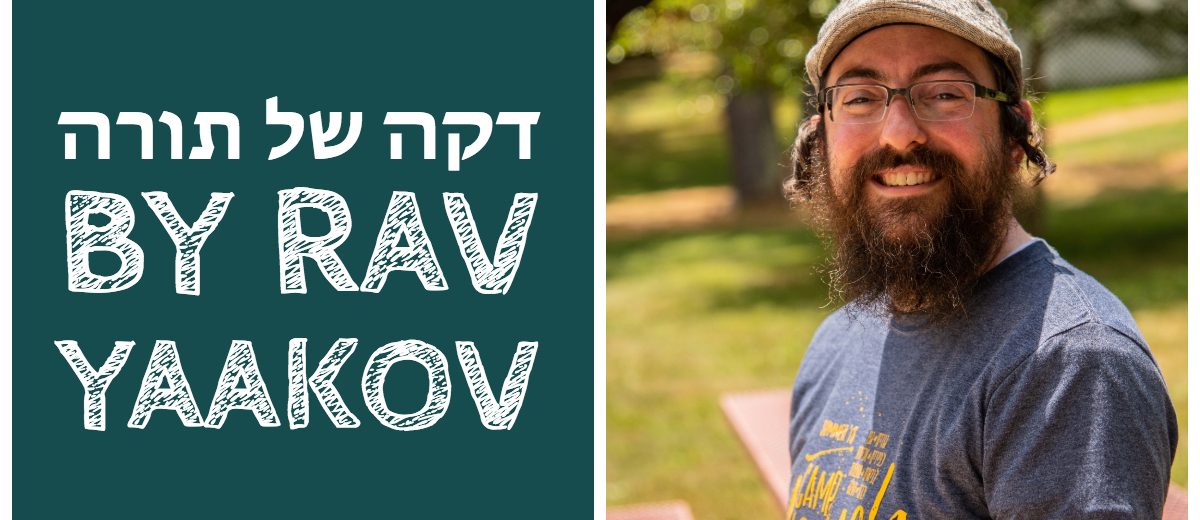Parshat Eikev
When I was in basic training, I had a commander who, every time we returned from a meal, would ask in his deep, imposing voice: “Achaltem? Savatem? Berachtem? – Did you eat? Were you sated? Did you bless?” Whether my mefaked was aware of it or not, he was almost quoting this week’s parsha.
This week we read about the the mitzvah of Birkat Hamazon, grace after meals:
“And you will eat and be sated, and you shall bless the Lord, your God, for the good land God has given you.” (Devarim 8:10)
The Torah doesn’t articulate the actual text of what this should be, but the Talmud tells us that it is comprised of four blessings. According to Rav Kook (Ein Eyah, 2, 218) the order of these four blessings teaches us clearly about how we should elevate our priorities. It teaches us how to take the most physical act in which we engage, eating, and turn it into one of the most potentially spiritually centering acts.
The first blessing, HaZahn et HaOlam Kulo, thanking God for providing sustenance for the entire world, was written by Moshe after the manna fed us in the desert. It speaks of the physical needs of the individual – the primary purpose of the manna was to be our physical sustenance. The second blessing, Al Ha’Aretz v’al HaMazon, praising God for the Land of Israel, was written by Yehoshua, after we entered the Land of Israel. Here we pray for the physical wellbeing of our entire nation, as Yehoshua was laying the groundwork for the establishment of our society, and for all the day-to-day needs of the nation. The third blessing, Boneh Yerushalayim, was written by David and Shlomo and focuses on the spiritual welfare of the Jewish nation, centered in Jerusalem. While David wrote the first portion, Shlomo added the part about the Temple, emphasizing that this is intended to be a “house of prayer for all nations.”
The fourth blessing, HaTov V’HaMeitiv, was written by the sages of Yavneh after the corpses of the Jews killed by the Romans during the Bar Kochba rebellion (which the Romans would not allow us to bury) did not rot, and were able later to be buried with dignity. This may seem like a dark ending to Birkat Hamazon, but Rav Kook teaches that the sages of Yavneh wrote it after the failed rebellion to actually encourage the Jewish people in exile, that even when we are at our most defeated, we are confident that we will ultimately reach the highest spiritual heights.
Here at our Yavneh, we recite Birkat Hamazon after every meal not just as formality or a requirement. This is a deep and powerful spiritual meditation on our priorities. Our physical needs are important, but once they have been taken into account, we must consider the physical wellbeing of all those around us. Then, we must look to the spiritual wellbeing of all those around us as well. Finally, we are reminded that our best days are ahead of us, and that we still have much to accomplish if we hold fast to our faith and our hope. As we come into our final weeks as a community in Kayitz 2018, let’s remember this each remaining time we say Birkat Hamazon together. Shabbat Shalom.
Questions for the Shabbat table:
- Why do you think it’s important to take one of our most physical actions, eating, and elevate it to a level of spiritual importance?
- Many faith traditions require some form of blessing before meals. As Jews we offer various blessings over all of our food. But in Judaism, these blessings are only a rabbinic requirement. Uniquely, the Biblical mitzvah is to offer a blessing after eating, not before. Why do you think that the emphasis in the Torah is specifically on the blessing after eating?




